Gespräch: Sich mit dem Unterschied identifizieren
Identifying with Difference
Discussion about Public Art
January 30, 2013, 4 p.m.
In the Kunstraum Niederoesterreich
Herrengasse 13, 1010 Vienna
Speakers/Participants:
In her talk, Ines Doujak (an installation, photography, and conceptual artist from Vienna) presents potential alternative forms of collective remembrance. Using two of her own works (which she calls "anti-monuments") as examples, she demonstrates how aesthetic practice can involve viewers and the remembrance of events be transformed into a living present.
The talk by Amelia Jones (an art historian and curator focusing on feminist and performance art from Montreal) explores performance art primarily from a feminist/queer context. Jones questions the conventional practices (defined by stasis) of curating and presenting art objects, while also presenting alternatives to these practices.
In her talk, Elke Krasny (a cultural theorist and curator with a focus on art, architecture, and urbanism) presents proto-curatorial models along the lines of a feminist historiography of curating art that goes beyond museums and exhibitions to address the interests and conflicts of the public realm. Using examples of her own curatorial practice in Vienna and Vancouver, she presents the politics of remembrance as a question of contemporary curatorial ethics located between activism and criticism.
Suzana Milevska (a cultural theorist and curator focusing on visual culture, film theory, and gender from Skopje) trains a critical eye at Macedonia and other East European countries, where public space is characterized by the imbalanced representation of men and women. The project Skopje 2014 serves here as an example of current manifestations of omnipresent patriarchism.
In Israel, representing contemporary history in the context of guided, performative tours, for instance, is key to the perception of national identity. Maayan Sheleff (a curator and cultural theorist from Tel Aviv who focuses on curatorial practices) presents artists and activist groups who use the format of such tours to introduce alternative narratives that broaden the official understanding of history.
Mechtild Widrig (an art and architectural theorist focusing on performance and public space from Zurich) approaches the notion of a delegate performance, which she uses to refer to VALIE EXPORT’s works. Her aim is to explore the ability of performance to create a connection between individual and collective memory.
Discussion about Public Art
January 30, 2013, 4 p.m.
In the Kunstraum Niederoesterreich
Herrengasse 13, 1010 Vienna
Speakers/Participants:
In her talk, Ines Doujak (an installation, photography, and conceptual artist from Vienna) presents potential alternative forms of collective remembrance. Using two of her own works (which she calls "anti-monuments") as examples, she demonstrates how aesthetic practice can involve viewers and the remembrance of events be transformed into a living present.
The talk by Amelia Jones (an art historian and curator focusing on feminist and performance art from Montreal) explores performance art primarily from a feminist/queer context. Jones questions the conventional practices (defined by stasis) of curating and presenting art objects, while also presenting alternatives to these practices.
In her talk, Elke Krasny (a cultural theorist and curator with a focus on art, architecture, and urbanism) presents proto-curatorial models along the lines of a feminist historiography of curating art that goes beyond museums and exhibitions to address the interests and conflicts of the public realm. Using examples of her own curatorial practice in Vienna and Vancouver, she presents the politics of remembrance as a question of contemporary curatorial ethics located between activism and criticism.
Suzana Milevska (a cultural theorist and curator focusing on visual culture, film theory, and gender from Skopje) trains a critical eye at Macedonia and other East European countries, where public space is characterized by the imbalanced representation of men and women. The project Skopje 2014 serves here as an example of current manifestations of omnipresent patriarchism.
In Israel, representing contemporary history in the context of guided, performative tours, for instance, is key to the perception of national identity. Maayan Sheleff (a curator and cultural theorist from Tel Aviv who focuses on curatorial practices) presents artists and activist groups who use the format of such tours to introduce alternative narratives that broaden the official understanding of history.
Mechtild Widrig (an art and architectural theorist focusing on performance and public space from Zurich) approaches the notion of a delegate performance, which she uses to refer to VALIE EXPORT’s works. Her aim is to explore the ability of performance to create a connection between individual and collective memory.
Identifying with Difference?
Conceived and chaired by Elke Krasny
The idea behind this event refers back to many themes that have been addressed in previous discussions – like feminism, art, politics and art as a dialog – while also attempting to relate these to one another. The presentations by the international and renowned members of the podium and the following discussion are intended to create a transnational space for the production of knowledge and dialog. In this symposium, we explore the issue of responsibility and solidarity in regard to engaging with the past, while searching for ways to convey individual and collective experiences (as well as images of experiences) in today’s world. We focus on the issues of the politics of remembrance, feminist practices, as well as curatorial practices at the crossroads of art and activism. The invited participants present their positions, which have been formed by different geographic, artistic, cultural, and theoretical points of reference. They illustrate how the politics (and comprehensive research) of history as well as artistic and curatorial activism can lay the groundwork for creating different approaches to history and gender politics.
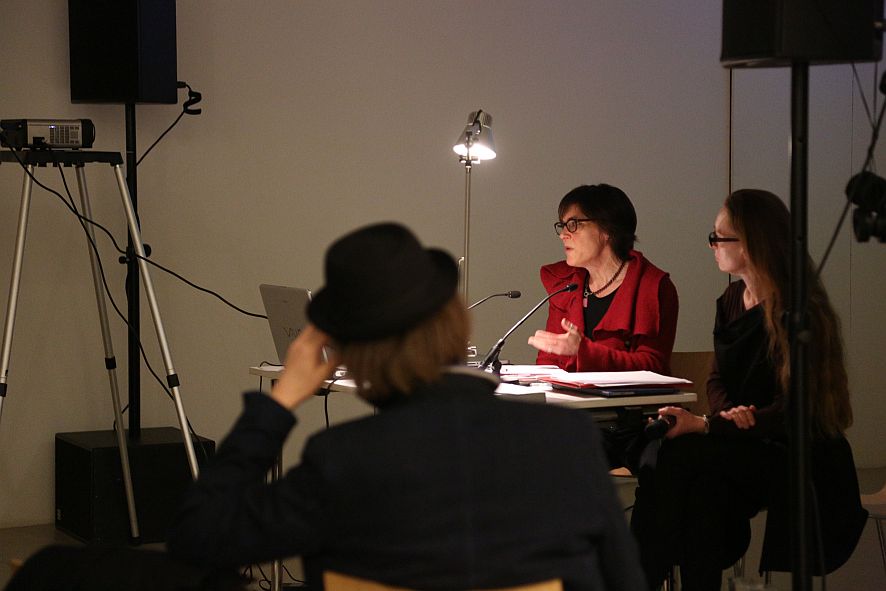 © eSeL.at
© eSeL.at
According to Elke Krasny: "The shadows of the past are growing longer. Identification in the present is marked by countless fault lines. In the context of a globalized artistic and cultural production, history not only becomes a resource that is widely circulated, but also a specifically local challenge through which different ways of dealing with remembrance, politics, gender, feminism, and difference can be demonstrated, artistically articulated, and applied to curatorial practice."
A related discussion led by Elke Krasny on art in the public realm took place in the Kunstraum Niederoesterreich in January 2014 under the title "Vulnerability and Resistance: The Public Dis/Appearance of Bodies."
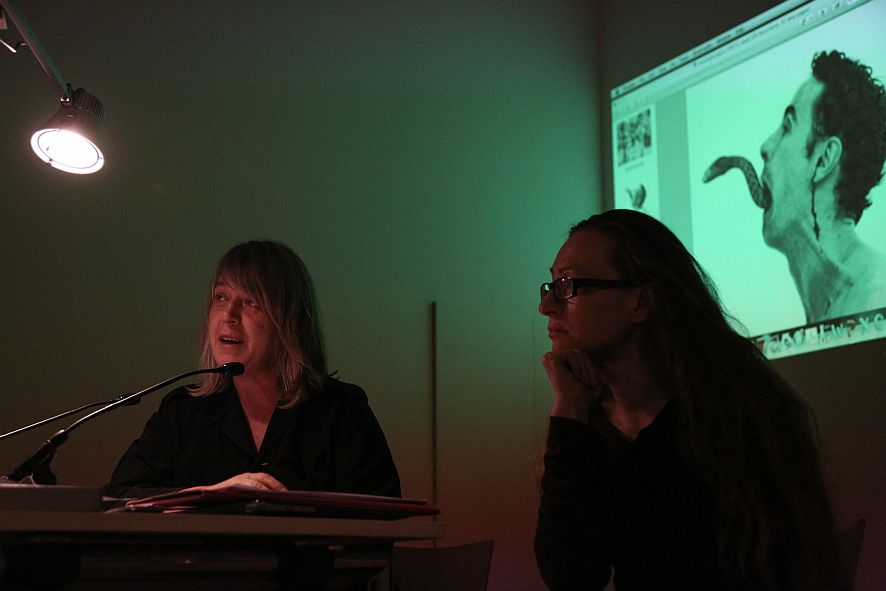
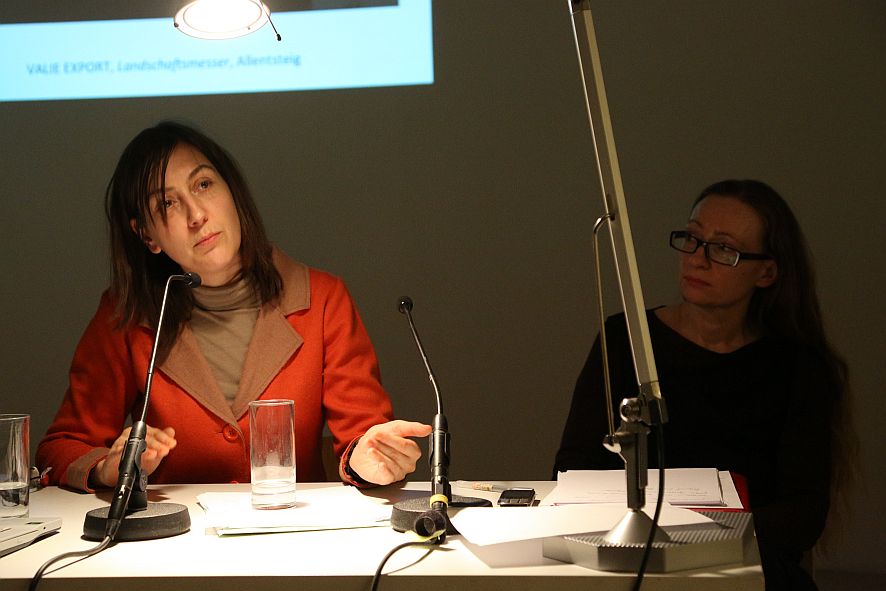
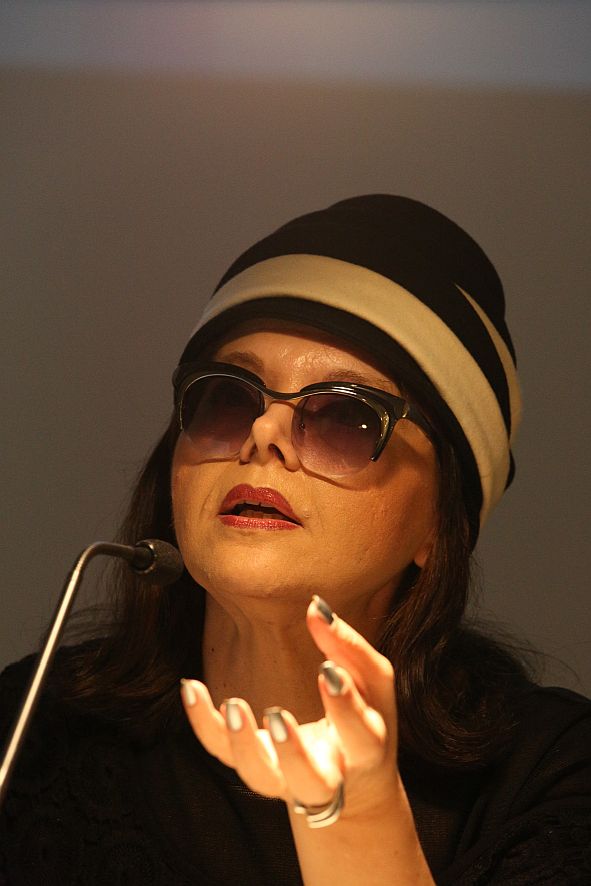
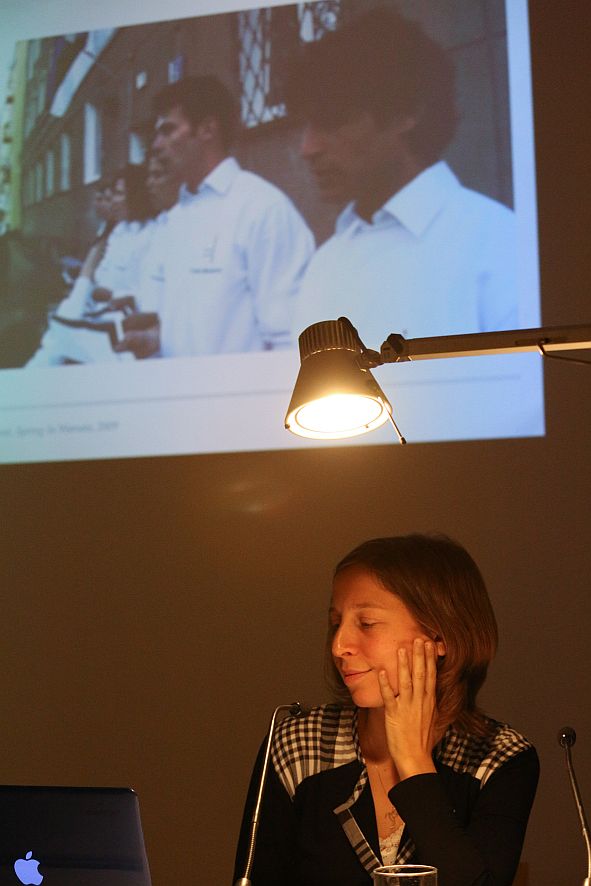
© eSeL.at
Conceived and chaired by Elke Krasny
The idea behind this event refers back to many themes that have been addressed in previous discussions – like feminism, art, politics and art as a dialog – while also attempting to relate these to one another. The presentations by the international and renowned members of the podium and the following discussion are intended to create a transnational space for the production of knowledge and dialog. In this symposium, we explore the issue of responsibility and solidarity in regard to engaging with the past, while searching for ways to convey individual and collective experiences (as well as images of experiences) in today’s world. We focus on the issues of the politics of remembrance, feminist practices, as well as curatorial practices at the crossroads of art and activism. The invited participants present their positions, which have been formed by different geographic, artistic, cultural, and theoretical points of reference. They illustrate how the politics (and comprehensive research) of history as well as artistic and curatorial activism can lay the groundwork for creating different approaches to history and gender politics.
 © eSeL.at
© eSeL.at According to Elke Krasny: "The shadows of the past are growing longer. Identification in the present is marked by countless fault lines. In the context of a globalized artistic and cultural production, history not only becomes a resource that is widely circulated, but also a specifically local challenge through which different ways of dealing with remembrance, politics, gender, feminism, and difference can be demonstrated, artistically articulated, and applied to curatorial practice."
A related discussion led by Elke Krasny on art in the public realm took place in the Kunstraum Niederoesterreich in January 2014 under the title "Vulnerability and Resistance: The Public Dis/Appearance of Bodies."




© eSeL.at

